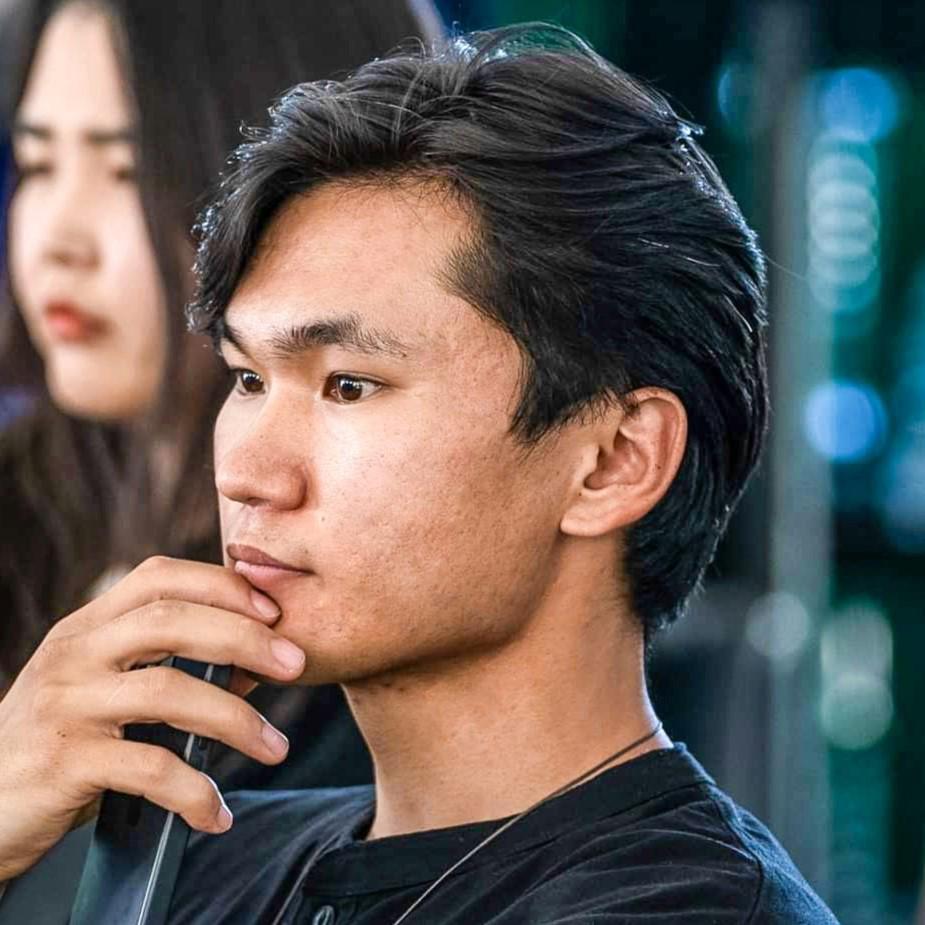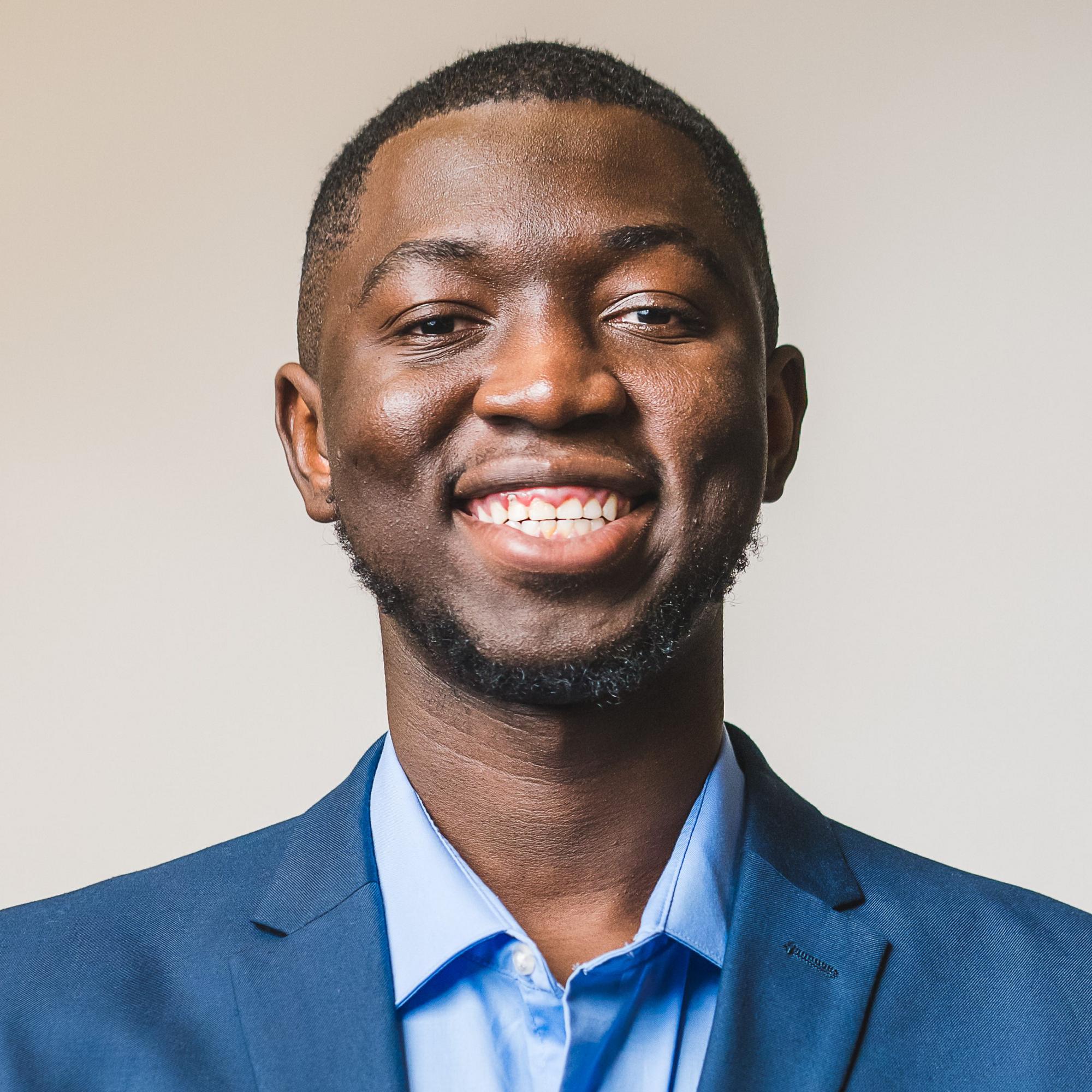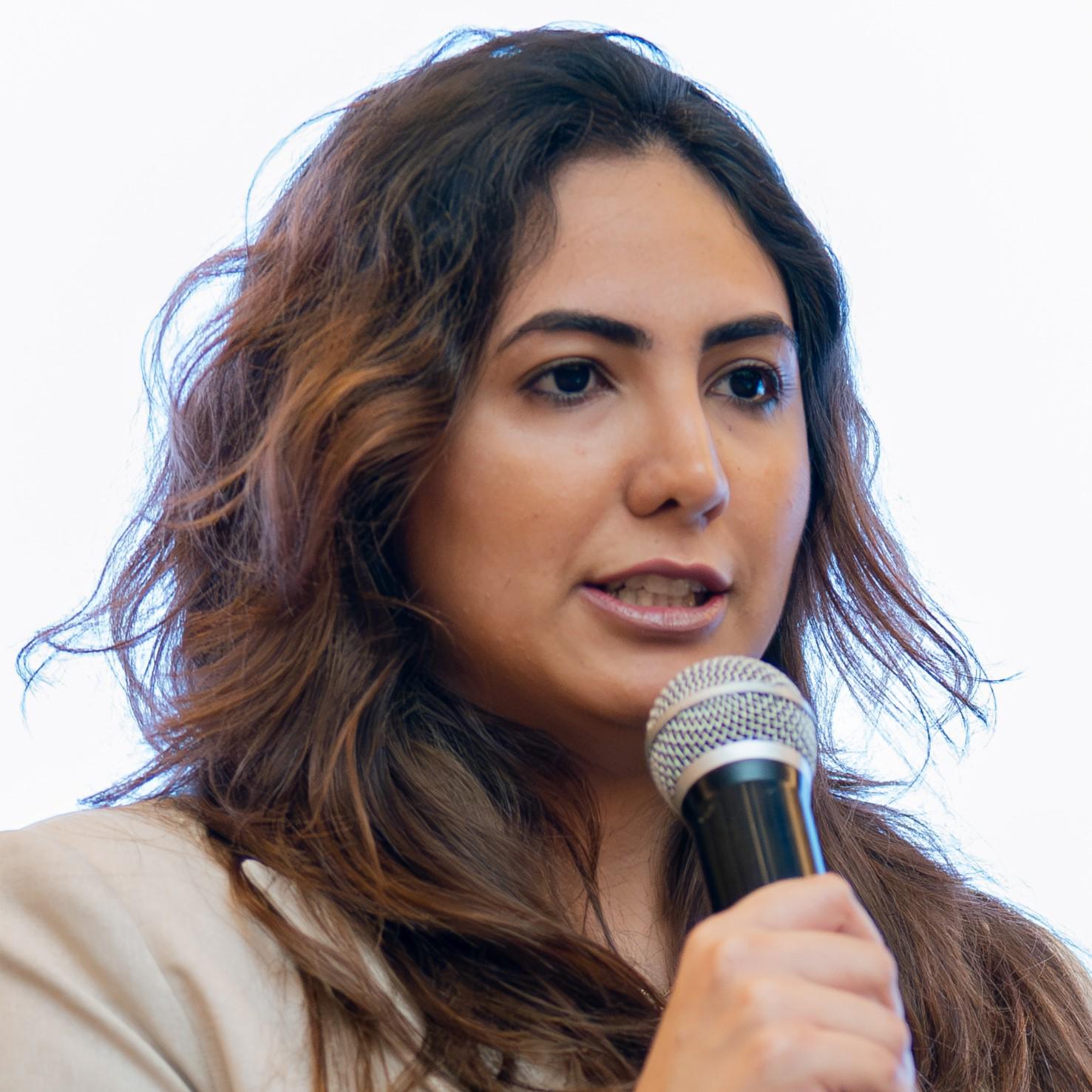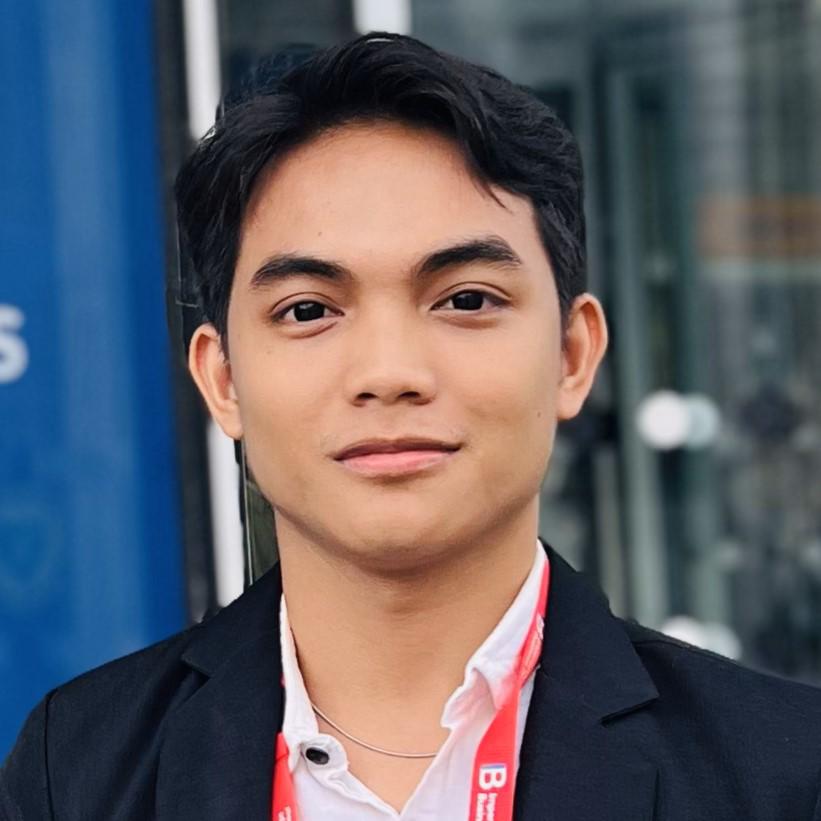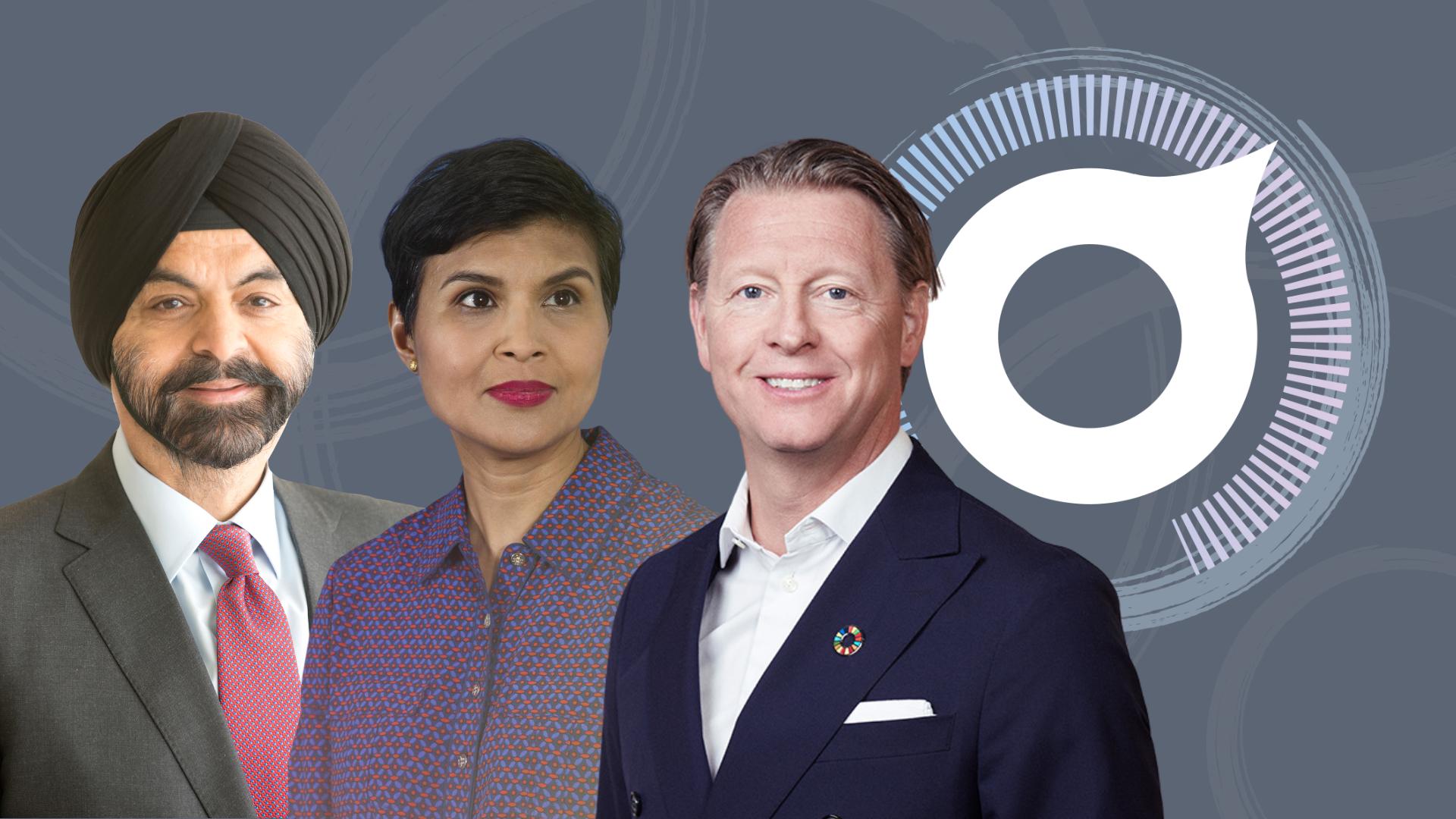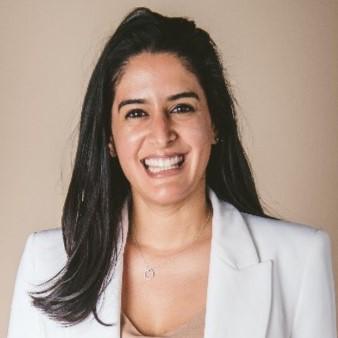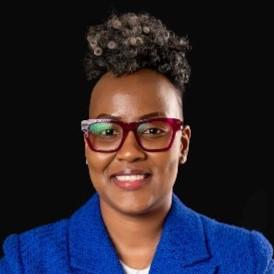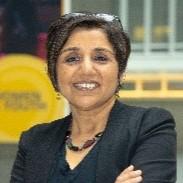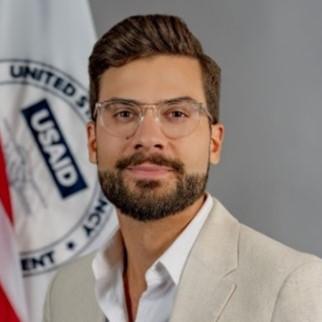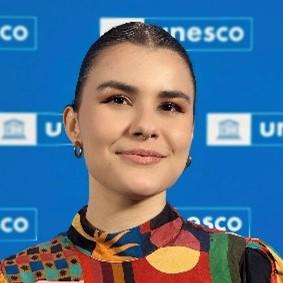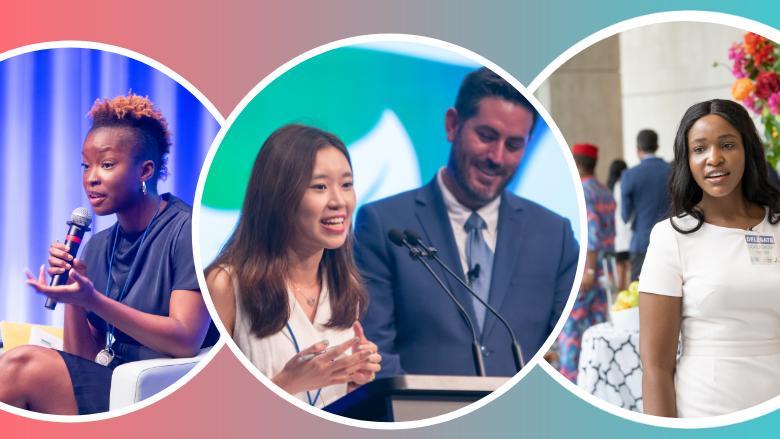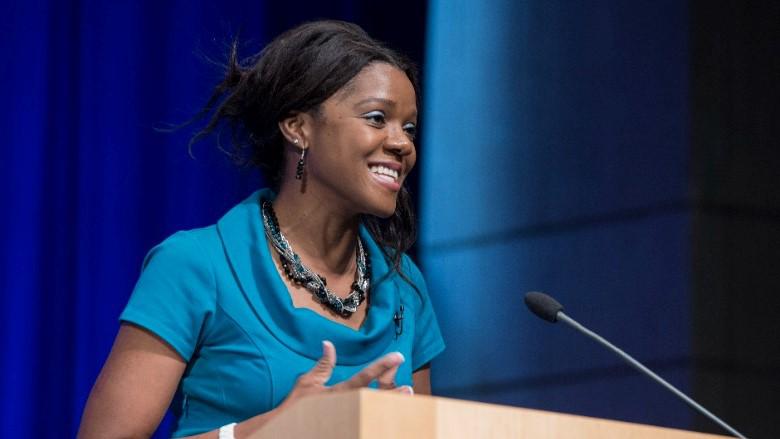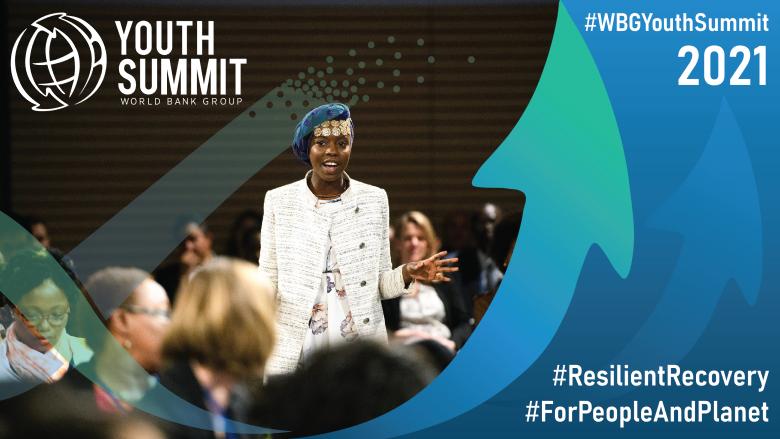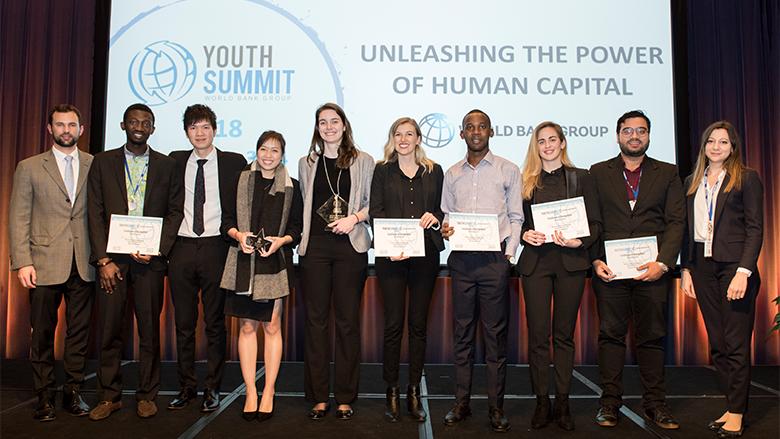Youth Summit 2024: Powering Progress

2024 World Bank Group Youth Summit: Powering Progress
- ABOUT THE EVENT
- AGENDA
- PITCH COMPETITION
- FAQ
GO TO: SPEAKERS
This year, the WBG Youth Summit focused on "Powering Progress: Youth Leading the Digital Transformation." Young innovators from around the world joined forces to explore digital solutions for global challenges. The two-day summit featured discussions on digital access and inclusion, AI, and sustainable technology. Highlights included inspiring talks by experts, career development workshops, competitions and networking sessions. Participants debated, shared pioneering ideas, and crafted actionable strategies, showcasing the vital role of youth in driving digital progress and shaping a sustainable future.
The winners of the WBG Youth Summit Pitch competition are:
- Jury Winner: Guadaluna Chaer – Luxeed Robotics
- Jury Runner-Up: Haris Hendrick – Tulibot
- Audience Choice Award: Benedict Owanga – OWANGA
Join the conversation with #WBGYouthSummit
[Iman Rahb Hamidaddin]
Ladies and gentlemen, esteemed guests and vibrant young leaders, joining us in person and online from across the globe, I'm so excited to stand before you today to open a Summit that celebrates the ingenuity, resilience, and leadership of youth in driving global progress. My name is Iman Hamidaddin, and I'm the Youth Summit Manager, and I serve in this Hearing Committee for the Youth Summit, along with 50 and other vibrant and remarkable youth just like you who are going to be sitting here throughout.
First things first, and on behalf of the Youth Summit’s Hearing Committee. Welcome to the World Bank Group Youth Summit 2024. Whether you're joining us in person in the heart of Washington, D.C., or joining us online from wherever you are sitting, from the farthest corners of the globe, your presence is a testament to the collective commitment we share towards shaping a future that is equitable, sustainable, and thriving with innovation.
In October of last year, the Youth Summit’s Hearing Committee held its first of many meetings to start planning for the 2024 edition of the Youth Summit. We gathered to discuss different ideas and themes that would shape this year's event. As you can probably imagine, it was a very lively debate. When you bring together 16 young people from diverse backgrounds, ethnicities, educations, and experiences, the result is bound to be a spirited and passionate exchange of ideas. Someone suggested focusing on youth activism, which sparked a fascinating discussion the ways in which young people are driving change around the world. We considered the impact of youth-led movements on social and environmental issues and how activism is increasingly powered by digital tools. Digital tools directed our attention to digital developments, and we ultimately chose the theme. So, today we gather under the theme “Powering Progress: Youth Leading the Digital Transformation.” It's a theme that captures the essence of our time, a period of unprecedented digital evolution, and a call for the youth to steer this transformation towards the greater good. The theme encapsulates a dynamic role of young people in leveraging technology to address global challenges. Over the next two days, we will delve into the intricacies of digital access and inclusion. We recognize that technology is a powerful equalizer, but its benefits are not felt equally. Our discussions will challenge us to bridge the digital divide, ensuring that every individual has the opportunity to connect, to learn, and to contribute to the digital economy. Artificial intelligence stands at the forefront of our agenda. It's a tool of immense potential… It's a tool of immense potential, reshaping industries, health care, and even governance, but with great power comes great responsibility, and we must guide AI's trajectory to enhance our capabilities, not replace them, and to serve humanity, not diminish it. Sustainable technology for a livable planet is not just a topic we will cover, but it's a call to action. As stewards of the Earth, we are tasked with leveraging technology to combat climate change, to preserve our natural resources, and secure a livable planet for generations to come. This year's Summit is unique. We're introducing three fresh perspectives, youth in fragile conflict and violence-affected areas, women in tech, and rural youth. These lenses will bring to light the diverse challenges and innovative solutions that arise from different contexts. To the youth in fragile and violence-affected areas, your resilience and ingenuity in the face of adversity is nothing short of inspiring. You remind us that progress is not just about technology, it's about the human spirit's ability to adapt and overcome. To women in tech, you are breaking barriers and paving the way for a more inclusive and diverse technological landscape. Your perspective is crucial in designing solutions that cater to all segments of society. And to the rural youth, your connection to the land and community provides a unique viewpoint on how technology can enhance traditional practices and connect remote areas to the global dialog. As we embark on this journey together over the next couple of days, I encourage all of you to engage actively, share your ideas, and collaborate with your peers. You're not just passive observers of the digital age. You are its architects, its innovators, and its conscience. The Summit is not just about discussing problems, it's about co-creating solutions, it's about leveraging our collective knowledge and passion to drive meaningful change. Together, we have the power to harness technology to forge a path of progress that is not only smart but wise, and not only advanced, but also just. I'm excited to see what the next two days unfold. Lastly, and on behalf of this Hearing Committee, thank you for your commitment, and your passion, and your willingness to dream of a better world. Let the World Bank Group Youth Summit 2024 be a catalyst for change, a platform for dialog, and a celebration of the youth who are not waiting for the future to come, but are actively building it today. I'd like to leave you with a message from the World Bank Group President, Mr. Ajay Banga, followed by a message from Mr. Axel van Trotsenburg, who is the World Bank's Managing Director on Development Policy and Partnerships.
[Ajay Banga] Welcome to the 2024 World Bank Group Youth Summit. Your generation is what gives me hope. You are the generation that pushes us and inspires us. You care about each other. You care about our planet. You are the generation that is driving creative solutions. We need that energy. We need that creativity. We need you to help us in our quest to create a world free of poverty on a livable planet. The world is at an inflection point. Multiple intertwined challenges from climate to conflicts are driving inequality. The best way to confront these challenges and lift people out of poverty is to create jobs. When people have decent jobs, they have more than just a way to support themselves and their families. They have dignity and they have hope for a better future. In the next 10 years, more than a billion young people, your peers, across the Global South, will become working-age adults. But in that same period, in the same countries, we expect that we will all create just 325 million jobs. That's a large gap. And many of you are looking forward to schools and careers, but too many don't have the opportunity to hope and to dream. That's what we are trying to change. I'm very optimistic that we have solved so many of humankind's problems over the years. We will solve this one, too. Your generation is the engine of my optimism, and your digital skills will be invaluable in the delivery of these solutions. The pace of change in the digital world is amazing, and I truly believe it has the power to move the developer needle much more than anything else. Digital technology enables new ways to reach people who have been traditionally left out. They've been left out of health care, out of education, out of banking, and so much more. This Summit is a highlight of our youth engagement. Over the years, it has served as a crucial platform for you to have your voices heard, to showcase your innovation, your solutions, and to connect with like-minded individuals. What I'm hoping is that this year will be the most successful, the most inventive yet. Whether you're joining us online or in person, I would encourage you, please examine the challenges facing the global community, build your collective vision, and work together to find those innovative solutions that will make us do what we need to do in the coming decade. Thank you very much. I wish you all the best for a very successful Summit together.
[Applause]
[Iman Rahb Hamidaddin]
Now we're going to share the message from Mr. Axel van Trotsenburg.
[Axel van Trotsenburg]
Hello. It's wonderful to welcome you to the World Bank's Group Youth Summit. This Summit is a powerful demonstration of what we can achieve through greater collaborations, partnerships, and knowledge. I've had the great pleasure to participate in this Summit every year as Managing Director because I believe strongly the role that you play in development. Your ideas, energy, passion, drive, and commitment can transform the world. We need transformation. One only needs to look at the massive challenges countries are facing, from poverty to climate, to conflict, to inequality, to understand that the challenges are immense. Only by working together can we give countries a fighting chance for a better future. I welcome the theme of this year's Summit, “Digital Transformation.” Thank you for the ideas, creativity, and experiences that you will be sharing over the next three days, to see how to make digital for all, not just an aspiration, but a reality. Enhancing countries' access to digital services is part of our broader effort to become a better Bank, one able to better serve the needs of our memberships. We are working with ambition and urgency across many areas. Digital is one of them, and knowledge is another. Our goal is to bridge the digital divide, ensuring that everyone, regardless of their location or circumstances, has access to the opportunities the digital world offers. The promise of a digitally inclusive world is immense. It can shape a future that is more equitable, resilient and sustainable for generations to come. That is why at the Bank, we are creating a new Vice Presidency focused on digital. We believe that a strengthened and consolidated team working on digital development can translate our vision into impactful projects that can help close the digital divide. We are also transforming the way we approach knowledge to better leverage the potential of knowledge, data, and partnerships to provide solutions to some of the world's biggest development challenges. This knowledge is not just our knowledge. It is the knowledge that countries have and are generating every day. The Youth Summit, an annual convening, is a really terrific example of the new knowledge Bank in action, one that is bringing together diverse voices, experiences and ideas, and charting a path for a better future. Thank you for your commitment, your passion, your willingness to be part of this transformative journey. Let's continue to work together to help countries overcome their development challenges, reduce poverty, create jobs, close the digital divide, and give people everywhere a chance for a better future. Please, enjoy the next two days and get to great results. Thank you.
[Applause]
[Iman Rahb Hamidaddin]
Thank you. Once again, thank you for joining us. I'm very excited to be in this journey with you, and let's power progress together. Thank you. Over to you, [unintelligible].
[Alice Vandenberghe]
So, now it's time to delve into the main theme of our Summit with a roundtable on “Powering Progress: Youth Leading the Digital Transformation” that will delve into how young leaders leverage technology to address global challenges. Please, welcome the speakers on stage. [Applause]
[Beatriz Reis]
Hello. Okay. Please go on then. Come on stage. Hi, everyone. Good morning. How's everyone doing? Enough coffee? Is everyone awake? We have two full days ahead of you. So, this is just the first session of two long days of sessions and engaging activities. I hope you had a good, well-rested night. We're going to go ahead with the first roundtable of the day. My name is Beatriz Reis. I'm going to be your moderator for this panel. I'm an External Affairs Officer here at the Bank, and I'm one of the Case Challenge co-leads for this year's Youth Summit. Our panel, as you can see, it's called “Youth Leading the Digital Transformation.” I have this distinguished panel of speakers here with me today and another speaker joining us online. So, I'm going to go ahead with introductions in a minute, but first, just letting you know that by the end of this panel, we are going to have a small Q&A, not only for the delegates here in person, but also for those joining us online. Hi, everyone. Thank you for coming. Let me go ahead with introductions. First things first. So right to my left, we have Courteney Mukoyi, he’s the founder of the Justice Code Foundation, a civic tech organization in Zimbabwe that leverages technology for civic goods. Thank you for coming. And then, right next, we have Namita Datta. She's a Project Program Manager for the World Bank’s Solution for Youth Employment, a multi-cycle global program that brings together private sector, CSOs, think-tanks, and youths to create and learn from more innovative solutions for youth employment. Thank you for coming as well, even though you're from here. Your drive was shorter. There you go. And then, you have Mumbi Ndung’u, the Executive Director of the Power Learn Project, a Pan-African social impact organization committed to empowering young Africans with essential tech skills. Thank you also for coming. And then finally, joining us also online, we have Cristina Pinto, the founder of the PIT Policy Lab, a consulting company focused on public policies and development of technology governance models, mostly on the Latin American and Caribbean region. Thank you for joining us online as well, Cristina. So, let's just go ahead and dive into the first topic for this session, which is obviously digital transformation. I think all of us here, not only in person, but also online, can agree that digital technology and investing in digital technology can really enhance access to essential services, can improve the efficiency of those services, and can power progress and inclusive growth. So, on that and on the focus of digital transformation as a way to lead to economic opportunities, but also fix some social and environmental issues, I wanted to take you to my first question, which is... Let me turn the page. Which is, and maybe, Namita, you can be the one starting since you work at the World Bank, and then all of our panelists can also jump in and give us their thoughts. But it’s in what ways do you believe digital transformation can contribute to ending extreme poverty and boosting share prosperity in a livable planet? And also, how do you say youth-led organizations and companies can use digital technology to tackle these global challenges? In your case, can you provide some examples from companies that you've been working with? And in the rest of our panelists, can you provide some examples from your own youth led companies on how you've been doing this? Namita, if you want to go ahead.
[Namita Datta]
Thank you. Thank you very much, Beatriz. What a pleasure to be here in this room and be connected with so many bright young people. So, thank you for inviting me. Your question about how can digital transformation address poverty and increase shared prosperity. Let's look at poverty and our goal about ending poverty. We know that one of the most important pathways out of poverty for an individual or for a household is having a job. We just heard our President say that. Having a decent, well-paying job. Now, when we look at the job market today, we know that this is undergoing rapid transformation. There are new types of jobs today that didn't exist just even a few years ago. An example of that are online freelancing jobs, like freelancing, gig jobs. They didn't exist a few years ago. These are jobs where the job comes up in one country, is being done by somebody in another country, all mediated through a digital platform, done on the platform, paid on the platform. They didn't exist a few years ago. And this is not a small number doing these online freelancing jobs. We just recently estimated that it's 435 million people across the globe. It's not a small number. Half of these people who are doing freelancing jobs are youth. Another 60% of this whole freelancing, people who are freelancers are people who are living in small towns and villages, in areas where there is really no other job. There is really no other well-paying job that's available to them. Many of these freelancers are women. Women who really like the flexibility that these kinds of jobs offer because you can work from home. You can also be looking after your children because we know women carry that burden. And also, you don't need to commute to a place of work because sometimes it's not safe enough. We talked about fragile and conflict-affected places. Really, people who otherwise, women, people with disabilities, rural youth, people who otherwise face a lot of constraints in accessing a good job are suddenly today able to tap into a global job market that didn't exist a few years ago. So, this is just one example of ending poverty. Let's talk about shared prosperity. Now, we know that one of the most important requirements for an economy to grow are viable, fast-growing profit-making firms. In the recent years, we know that one of the most important economic engines of growth have been e-commerce platforms. These are vast marketplaces that have not just simplified shopping for people like you and me, but they're really providing small and medium enterprises an ability to tap into a global customer base, really important for prosperity. These are just two examples that really all that you sometimes need as a gig worker, for example, is Internet, access to a laptop, perhaps, and maybe a mobile device, and it's opened up the world for you. These are just two examples, but I think we cannot talk about increasing access to health care, to education, financial inclusion without, in some form or the other, talking about some form of digital technology. So, I think it's really now fundamental for development. You asked me about examples. I'll just quickly share. So, we in Solutions for Youth Employment at the Bank, we don't think of youth as beneficiaries, as beneficiaries of our development programs. We think of youth as allies, as solution creators, and I think you're all proof of that. Recently at COP, we launched something called the “Youth Innovation Challenge,” along with our water colleagues. The idea was to identify “aquapreneurs,” the young people who are solving the water crisis of the world. So, there's this young Nigerian woman who's created an AI app that helps use crowd-sourced data to identify water scarcity hotspots. Or another young Indian woman who's come up with this spray can formula that you spray on public toilets. It creates like a thin film which stays for a month and is antibacterial, and that reduces the use of water to wash toilets, and reduces UTI infections and risks of that for women. Or another young woman from Mozambique who uses recycled plastic bottles, that fishnet plastic, to produce prosthetics and wheelchairs out of plastic. I mean, I could go on and on, but I think I have to stop. But these are just examples of how youth are as much, I think, they are leaders in solving some of the crisis that we face today. I'll stop here.
[Beatriz Reis]
Mumbi, I don't know if you want to go ahead, go next.
[Mumbi Ndung’u]
Thank you so much. My name is Mumbi Ndung’u, as mentioned. I'm from Nairobi, Kenya. Great to be here. I think for me, digital transformation, I look at it on two approaches. One is using technology as a catalyst. So, what we do at Power Learn Project, we provide decentralized tech education to a lot of young people across Africa. Our flagship program is known as “1 Million Developers for Africa,” where we are providing scholarships to train a million software developers across Africa. So far, we've been able to train about 15,000 across five countries in Africa. And this is just a drop in the ocean. We've been in operation for the past three years. And this was heavily borne through the pandemic because we saw there was a huge gap during the pandemic. A lot of businesses struggled to digitize so they can continue operating, especially across the continent of Africa. When we went on the ground to find out what are some of the reasons for this is because the cost of acquiring talent was extremely high. And even if they acquired the right talent, most of them were not qualified enough because the education was not at par with what they needed to compete globally. So, we decided to create an innovative education program where we would provide solutions for tech education, and this is how our program was born. So far, we've been able to train over 15,000. 63% of this 15,000 are already actively working in different spaces. Some of them have become entrepreneurs. We have three key pathways that we provide them with after their training. One is employment, secondly is entrepreneurship, and third is upskilling. Employment, we've seen, and I think she also just spoke about it, is a lot of our young people are working remotely, so they work for different companies globally, but they get to remain at home. They get to provide opportunities to their other members of their community through the money they earn from the remote work. Secondly, entrepreneurship. We've seen a lot of solutions that have been created. What we do is we really advise and create solutions around SDGs, SDG challenges. We've seen a lot of them creating solutions for some of the things you'd least think about. Just to give an example of one young a lady who created a solution for, she created what we call an Uber for school-going kids, because she realized a lot of parents were struggling to take their children to school in the mornings when they didn't find the school busses available or they didn't find the drivers that they relied on and trusted in available. She decided to bring together all these drivers that the different estates within the community is trusted and put them in an app and give them opportunities for work, but also give parents a space where they can trust these people to deliver their children to school and back home, and they would go to work feeling safe that their children are okay. That is just one of the solutions that we've been able to see out of all these young people we've been able to train. Our goal is to train a million developers across Africa. This seems like a huge number, but in actual sense, it's not even hitting the mark of the current need in the market, not only in Africa, but globally. As we speak at this moment, we're also providing talent to Austria. As we speak right now, my team is working on taking 80 young people to Austria to go and work there because it's a huge gap across the world when it comes to digital skills. And that's ideally what we're doing at Power Learn Project, but also just providing the solution for digital transformation, not only in my continent, but across the world over. Thank you.
[Courteney Mukoyi]
Thank you. Thank you. Thank you very much. I'm excited to be in this room full of young energy. As a young person from the Global South, it pleases me to be in such a platform like this. Allow me to first acknowledge that for me, in terms of understanding digital transformation in such a way that it brings impact to the ordinary person in the streets in Zimbabwe, in South Africa, in Costa Rica, wherever you can think of. I think we need to put it in context, and we need to look at it within the lenses of the people who are going to be affected by it, and also to look at it in terms of the impact that it's going to make. The reason is because when you are speaking of digital transformation, we are simply talking about a change from the traditional approaches that we used to new approaches in terms of governance, in terms of doing business, in terms of systems change. So, that is basically my understanding of digital transformation, to the extent that the new approach includes or it is tech-oriented. However, we can talk of digital transformation that has negative impacts. We can speak of examples just like in China. There is digital transformation, but the government of Xi Jinping is basically using cameras, technology, CCTVs to surveil its population and create censorship. We need to look at it in terms of context and its intended impacts. So, the input that we have is technology, the process being digital transformation, and the output has to be positive. For me, any digital transformation that creates positive impact within the community is worth recording and is worth speaking about. In my context, as an example, I will speak of the work that we have done. We have created a civic tech organization, and it's a civic organization that is using technology to enhance young people's participation in governance in Zimbabwe. Recently, we developed an AI platform that helped more than 700 young people to vote for the first time in the 2023 elections. Also, to document human rights abuses in Zimbabwe. Those are the stories that we should speak of and the impact that we should speak of. I just brought this and had to put this in context because there are quite a lot of examples where transformation is happening digitally, but it is leading to unintended consequences. We need to keep that in mind. And then also we have had a lot of examples from across the continent of various organizations, various youth-led startups that are doing amazing work to bring digital transformation and create positive stories from across the continent. We can speak of organizations such as Advocacy in Nigeria, which is using technology to ensure transparency and advocacy in different and various states of Nigeria. We can speak of SEMA in Uganda. We can speak of Machangura in South Africa. We can speak of Farmhut in Zambia. These are stories that I think are all positively contributing to the overall objective of ending poverty one way or the other, but I think digital transformation cannot function exclusive from other factors. I spoke of context, and it is important, especially as a young tech entrepreneur from the Global South, to highlight some of the challenges that we face. These are basic day-to-day challenges that sometimes many people may not relate to because we are from two worlds apart, electricity can be a challenging issue. As a young entrepreneur, I have to wake up, first think that, “Oh, God, there's no electricity. Where am I going to get my laptop charged? Where am I going to get all of my devices charged so that at least I can start working?” The other challenge could be Internet connection. I am based in the rural areas, very remote areas, and there is no supporting infrastructure. The mobile data is very expensive. These are some of the challenges that I think we shouldn't speak in isolation with the initiatives that various young people are championing to end poverty from a Global South perspective. Thank you very much.
[Beatriz Reis]
Thank you. Thank you, Courteney. Cristina, you're online, but we haven't forgotten about you. Do you want to share your inputs on digital transformation and how it tackles global challenges?
[Cristina Martinez Pinto]
Of course. Good morning from Mexico City. It's 6:00 AM down here, actually, so my coffee is just kicking in. I just want to thank you. Can you hear me well? Perfect. Great. Well, I truly want to thank you, the World Bank Youth Summit, organizing this Summit for this invitation. I want to share with you that years ago, I was an attendant to this event. I was inspired by the World Bank’s mission, by young leaders around the world, leading with example, and later, actually, I had the opportunity to become a consultant to digital development global practice. And so today, I'm really proud to be a speaker and to share some of my learnings, but most importantly, to tell you that these learnings come from practice, from over 12 years of work that started when I was even younger. So, I am certain that in a few years, it will be you, the youth from the audience, taking over this space to talk about entrepreneurship, about your projects, dreams, about your call to drive meaningful change. And that being said, at the PIT Policy Lab, we're leveraging digital technologies for the public interest, and we mainly work at a public policy level with a focus in the Latin American and the Caribbean region. So, the way we see it, it is about societal challenges that we are facing and about how to tackle these challenges. This means that to us, digital transformation is a strategy to close a different set of existing gaps in terms of connectivity, of inequality, in access to knowledge and skills, just to name a few examples. So, these are very specific themes in which digital transformation can contribute to boosting, share prosperity, and to democratize access to opportunities that are stemming from the digital economy, but also from a digital society. To the other questions that you shared, Beatriz, I wanted to quickly shared with you two brief examples. One as a female-led youth organization, and another one more specific on the work on development that we're doing in Global South countries. First, I was 32 years old when I founded PIT Policy Lab during my maternity leave, and everyone in our team was under 30. I spent our first year of operations pregnant with my first daughter. And in our second year of operations, I hired our general manager, who is also a young, remarkable person, professional, who was also in her fourth month of pregnancy at the time. The reason I am sharing this with you is because youth led organizations like us are setting new work standards, are operating fully remote, are flexible to accommodate personal needs, like motherhood as Namita mentioned; but most importantly, we are results-oriented and impact-oriented. And this, of course, has its own set of challenges, but I think this could be the topic for a whole separate conversation. Then, second to the other example, since we work on the field of public interest technology, as I said, at a policy and governance level, we have created a portfolio of projects and pilot programs in areas like education, anti-corruption, crowd work, gender-based digital political violence, future of work, smart tourist destinations, transformation of municipal governments. You'd be really surprised that among some of the main learnings that we found from these projects, they're actually mostly analog. It's the focus on people rather than technology, the importance of multi-sector and multidisciplinary collaboration, the need to drive organizational change, and understanding that government and private sectors work on their different logics and at a different pace, developing talent and ownership among projects, among the different stakeholders involved. So, in a nutshell, for us, digital technologies are tools at our disposal, and our key enables us to scale our work and advance development initiatives, but actually, we believe that we have to be cautious as not to fall into techno-solutionism traps. Thank you.
[Beatriz Reis]
Thank you. Thank you so much, Cristina. And thank you all for your answers. I think the key takeaways I got was first and foremost, let's allow youth to lead this transformation because we already have a different mindset. And like Cristina is sharing in the case of our own organization, we already think of things in ways that did not always happen with the previous generation, and hopefully next generation will be even better. Let's create solutions that are really focused on the people that are affected, that are focused on the SDGs, on the development issues. Let's make formal job creation, and let's have decentralized tech education. I think those are really the main takeaways that I got from all of you. And you actually made my job much easier because my second question is going to be focused on artificial intelligence and how AI-driven solutions can really help tackle these issues. All of you already provided some very interesting solutions, AI solutions, and how they focus on these challenges, but maybe I can also make this question, and we can have short answers until we go to our final question. We can start with you, Mumbi, which is, how do you think, specifically, AI-driven solutions can foster economic opportunities and educational opportunities, especially in your case, since you focus on this education side, and then everyone can share their thoughts a little bit, too?
[Mumbi Ndung’u]
Thank you so much. We've seen a lot of opportunities have come up because how I look at it is artificial intelligence gives access to a lot who would not ideally have access to some of these opportunities before, but looking at education, just to give an example of, again, post the pandemic, one of the sectors that was most affected, I think globally, and especially in the continent of Africa, was around education. My country, Kenya, is one of the most developed countries when it comes to access to Internet, and we're still one the most struggling when it comes to adapting to education post-the pandemic, because a lot of us were not prepared. A lot of the countries were not prepared for such a huge impact, especially around education, because we had not digitized a lot of what we were doing in schools. And I can see a lot of them trying to do that now, which is one of the key areas that I personally want to address. And looking at what we've been able to create with what we do at Power Learn Project is showing that innovation around education can give opportunity to a lot of people. Our program runs virtually. And through that, we've been able to access some people in the most remote areas. Just a few weeks ago, before I got here, we were able to graduate about 350 young people from one of the remotest areas of Kenya, which is known as the Kilifi County. In this county, access to Internet is still a challenge, access to hardware. We had to provide solutions where 10 students would work to go somewhere to get access to a computer so they're able to finish this particular program. I think opportunities for education are there. They are extremely, extremely important for us to pursue. I think use of artificial intelligence because of the data that we are able to collect and aggregate, we'll be able to know where are some of these key problems, and then how do we address them. Using something like generative AI, we don't have to continue using the same types of education we've been using all through. We innovate around the education to make sure that we get more young people to access to this education, and they're able to go out into the market faster instead of still depending on what we used to use before the pandemic. Thank you.
[Namita Datta]
I think AI, or for that matter, digital technology is not an end in itself. It's not AI for the sake of AI. The real question is, can AI help us level the playing field? I think that is the real question. When we think about leveling the playing field, I think one of the biggest levelers, I agree with you, is education. You could be born in a really poor family, but if you got access to a really good education, you could potentially lift yourself out of poverty. But education in itself, and you were highlighting this, is not a level playing field today. I think that we need to begin to think about education as a service, and our clients are little children, and children are not all alike, right? Some children learn, they're good listeners, some children learn visually, they're better visual learners. Others prefer to learn by hands-on tasks. So, children are all different. And then on top of that, children from very disadvantaged families have so many layers of constraints before they can even become learners. I think this is where AI can be a game changer. I think I think what AI allows us to do in education is to really treat education as a service, what I mean by that is to personalize education according to the client. There is this software called Read2Me that's being used quite a bit now in Indian schools. What it does is it adapts itself to the pace and the style of the learner. It's a reading assistance software, and it's improved academic performance among kids, particularly when you're talking about kids who have diverse linguistic backgrounds. Or think about children with learning disabilities. It's a lifeline for them to be able to do speech to text, for example. You can articulate your thoughts without necessarily having to type. And so, I think this is where education can fundamentally change things because it allows us to customize education. It allows us to customize the content of that curriculum, to customize the pace at which it is delivered, to customize the language in which it is delivered, and really begin to have a truly inclusive education. And why I think that can be a game changer is because the moment you have an inclusive education, you've at least allowed people to potentially then have more inclusive access to better paying jobs, more incomes, and begin to address the other types of inequalities that we see in the world. I think this can be a game changer.
[Beatriz Reis]
Thank you. I'll be stealing the sentence “AI as a game changer” in the future, I'll credit you, Namita. Cristina, I don't know if you can go ahead, and then Courteney can also give us a few thoughts.
[Cristina Martinez Pinto]
Yes, of course. Well, I think that as a general-purpose technology, artificial intelligence can be used across industries to foster economic empowerment of youth. For instance, through fintech solutions or enabling financial inclusion and providing young people with access to their first credits, or through data analysis that informs policies supporting youth employment and entrepreneurs, exactly the work that Namita and Mumbi are doing. I think there are many ways in which entrepreneurs can integrate AI into their startups and the most obvious, perhaps, to provide customer support via chatbots to identify patterns on trending data, to improve services through product innovation. But I think that what is key for entrepreneurs is to connect the dots across themes. For example, and my colleagues have somehow already touched upon this point, but to ask ourselves, how can AI be leveraged to advance the SDG agenda? What Sustainable Development Goal or ESG criteria, Environmental, Social, and Governance criteria, are we considering through the offering of products and services? As an example, Funda, I'm not sure how it's pronounced, is working in the African continent and is impacting more than 3 million students with a solution that integrates into WhatsApp, who is using meta foundational model, Llama, to provide customized educational opportunities. In Mexico, for example, the AI for climate initiative led by C-Minds is using an AI-based solution to monitor and preserve jaguar life in the state of Yucatan. I think this is pretty cool and pretty innovative. I also want to share with you one of our flagship initiatives that's called Equitable AI Guanajuato Use Case, that focuses on preventing school dropout at middle school years. We formed a partnership with a consortium of international organizations. We were sponsored by USAID and partnered with a local government in Mexico to identify and mitigate gender bias impacting education policy outcomes. Our main goal within this project was to mainstream gender perspective through the life cycle of an initiative at the local Ministry of Education. We basically trained their team in the use of an open-source tool for bias mitigation, but we also trained them on things like gender, human rights, technology and the intersection of these topics. Our intervention allowed us to identify that according to an AI-based solution that the local government is using, about 4,000 female students were incorrectly being labeled as not being at risk of dropping out of school, and therefore, were not being subjected to a retention education policy. I think this is a clear example on how the responsible use of technology and the mainstream in gender perspective can enhance educational opportunities for women and vulnerable groups, specifically.
[Beatriz Reis]
Thank you. Thank you so much. Courteney, do you want to give us a few thoughts on AI, especially considering your own organization?
[Courteney Mukoyi]
Okay, thank you very much. I think for AI to be very effective and scalable, generally speaking, I think it needs to understand two things. Number one, the people that it is intending to serve. Number two, the environment within which it is going to be implemented. I'll tell you a short story. In 2022, we came up with a chatbot. This chatbot, its main purpose was just to educate young people, specifically on voter information, where they could easily locate the closest polling station, what the Constitution says about elections, what various laws say about elections in Zimbabwe. The other thing also that it was supposed to do was to help them document abuses in terms of electoral violence and any electoral malpractices that are happening in different locations. So, we had met this platform, and now we were debating what is the best platform through which we can deploy this so that it is much more accessible, and what are the contextual factors within which we need to deploy this solution so that it is easily used by the local people? What is the local content that we need to also include? So, we realized an interesting fact that in Zimbabwe, more than 44% of Internet usage is accounted for by WhatsApp alone. Immediately, we had to deploy our solution as a WhatsApp chatbot. Those are contexts and factors that I think AI solutions need to pay attention to, so that they are easily adopted, so that they are effective, so that they are scalable. This also helped us to reach more than 45,000 people within a space of nine months and assist more than 700 young people, new voters, to register to vote in the 2023 Harmonized Elections. And then, understanding the context, the environment within which it is being deployed. It is also an important factor because we had to transform the content into the three main local languages so that people understand this new monster, this new technology that they are interacting with, so that they can easily to assume the content that was made available to them. So that is what I think is important, understanding the people and understanding the environment. Thank you.
[Beatriz Reis]
Thank you. Thank you so much. So, I think it's all about using as Namita said in my new favorite sentence, “AI as a game changer,” AI as a way to level the play field, but also be aware of responsible use of AI and be aware of the environment, the people in the context in which you use it. Okay, so let's go to our final question before we open it for questions for our delegates. So, also to be mindful of time, I just want to go to each one of you and ask, and focus on the future of digital innovation connected to what we just talked. Maybe each one of you can, about this topic, tell us a trend that you think we should be mindful in terms of digital innovation in its future, and a piece of advice for all the young leaders here in this room and those seeing us online as well. We can start with you, Courteney, and go, Namita, and Mumbi, and then Cristina.
[Courteney Mukoyi]
Thank you. I think as the world is moving forward, people are now beginning to seek technologies that are transparent, that are more privacy-oriented, that are more secure, and equality-oriented, and even more so open source. I think the next technologies that we may look out for that might be trending would be AI that is more truth-seeking and communication platforms that are more private, more secure. I think that's why a lot of people are running away from platforms such as WhatsApp to Signal. And also, it may don't know if this would be the right platform to talk about this, but I think even digital currencies that are more borderless, more censorship-busting, technologies such as Bitcoin, which I think have made great impact in the Global South in cases such as Nigeria, where protesters had their bank accounts blocked during the End SARS protest, and they had to resort to Bitcoin. Those technologies that are effective, I think, is what we should look out for. Thank you.
[Namita Datta]
Two years ago, there was an article in Harvard Business Review that said that one of the most important requirements for success for an individual or even for an organization was to develop what they called a digital mindset. This was defined as a set of attitudes that helps you see new possibilities in data, algorithms, and artificial intelligence in a world that is now increasingly going to be dominated by data-intensive and intelligent technologies. So yes, digital mindset, I don't think we need to say that here. It is very important. I think it's not enough, though. I think that it is a necessary but not sufficient condition because I believe that digital technology will definitely, absolutely certainly be a force for growth. We know that. It is going to unleash growth, but it is not automatically going to be a force for inclusion. That will not happen automatically. Unless we channel the energy of this force towards more inclusion. That's not going to happen on its own. Growth may happen on its own with digital technology, but not inclusion. So, my advice to the bright young people that are here, if you are developing a startup, whether it's in health tech or ed tech or clean tech, whatever sector you're in and you're using technology as a solution, I think the question for you is, is this new use of digital technology going to include people who were otherwise excluded in the non-tech world? And if your answer is yes, you're on the right track. We need all your energy. We need all your passion. We need all your digital mindset, but not just a digital mindset, a digital for inclusion mindset. I would just like to say that. Thank you.
[Mumbi Ndung’u]
I think mine is just to reiterate what they both said. I think the future is looking towards more inclusive technologies just to provide solutions, and I think it's also how the current and existing generations also operate. They're very biased towards inclusion. Is this serving me? Is this taking care of the environment? I feel like that's where the technologies are heading. A lot of that, but also just looking at in terms of what you mentioned before, which is data privacy. I know a lot of people don't have the understanding around that particular issue of censorship and privacy. So, I also see a lot of that in the future, especially because of AI and all the access to all the data across the world. And I think lastly, it's just to advise anyone who's looking to or working on their startup is how to leverage that data to make more responsible decisions on the solutions that you're creating for your users, ideally. Yeah. Thank you.
[Beatriz Reis]
Thank you. Cristina, you want to go ahead?
[Cristina Martinez Pinto]
Yes, sure. Well, as a trend, I've been seeing lately that a lot of the conversation right now is centered around generative AI, with many examples, focusing on AI in the context of educational learning; but I also think that digital innovation will be relying increasingly more into tapping into mixed realities for all kinds of educational, recreational, and business purposes. I'm really optimistic about entrepreneurs in Global South countries driving innovation. But to be honest, I'm also a bit worried about funding sources being scarce, and that some of the key institutions working in the transformation of public interest technologies are US based or euro centric, and often constrained by geography. I also see new trends that excite me. For instance, the amazing work that the Feminist AI Network is doing globally to advance a more equitable field of practice. When, for instance, in Latin America, AI startups are growing exponentially, but women make only 8% of founders and 15% of the AI startup workforce. In this sense, I believe we should be paying attention to the development of policy agendas that are embedding ethical principles and practices to make the most out of emerging technologies while mitigating the risks, but are also taking into account context in this equation of policymaking for development and deployment of such technologies. My advice to other young leaders wanting to use digital technologies to make a positive impact in their communities would be to first identify which technologies can be useful, again, in the context of the work they do, to potentially look for partner organization that align with their values, to help them scale their work, that can help you scale your work, and who provide training or in-time resources, and this can be government, international organization, companies or academic institutions. But I think it's also important to use tools at the disposal for entrepreneurs that have been created, at least in Latin America by international organizations like GAF or the Inter-American Development Bank, like ethical AI guides or self-assessment tools for the ethical deployment and development of artificial intelligence. Although I do think that the most important thing is to not lose sight that what we should always have at the center are people and their needs, and not the technology for the sake of technology. Thank you.
[Beatriz Reis]
Thank you. Thank you to all of you. I hope everyone registered this advice. You're going to have two full days of advice, so bring a notebook. Actually, you got a notebook, so just write all of it in the notebook you got. We have now just five minutes for questions. So, if anyone here in person wants to line up in front of the mic, and I can already ask you, Courteney, a question that we got online while people are lining up on… Let me see. How does digital transformation contribute to poverty reduction in African countries that face a lot of challenges with Internet access and connectivity? And also, just for everyone lining up, just want to be mindful of time, we only have five minutes, but we do have two full days of sessions, and everyone can make a lot of questions to the experts that we're going to have for these two full days. So, if you don't get to make your question, don't worry, you have a chance.
[Courteney Mukoyi]
Thank you very much. As I mentioned earlier on, I think in Africa or in any context where there is a challenge in terms of infrastructure, the first thing that we need when it comes to digital transformation is to have further supporting mechanisms or systems or structures. I'll give an example. There is a very famous fintech startup in Zimbabwe and most African countries called Mukuru. What it does is it enables people to send and receive money locally and even internationally, but then it understands that there is an old grandmother who is living very far down the road, and for her to travel to the closest point, which could be a growth point, a city or a town, that could cost her money, and that would be a great inconvenience. So, what they did is they supported their tech platform with decentralized booth models. So, you have a tech platform, and then you have a booth in point A, point B, point C, point X, so that it comes much closer to the intended customer or to the intended consumer. That supportive infrastructure would help greatly when it comes in the context of any technological innovation or any tech-oriented transformation that is intended to end poverty in Africa. It needs that supportive structure. It could be from the person who is leading... [Interpreter talking in French] [Courteney Mukoyi] … in the remote area. [Interpreter talking in French] [Beatriz Reis] I hope the person online got their answer. [Interpreter talking in French] [Beatriz Reis] … second person as well for the other speakers, and then we can wrap up. Sorry to the others, but again, you'll have your chance, promise, but go ahead. [Hillary Innocent Taylor Seguya] Well, thank you so much for the wonderful deliberations you've made. My name is Hillary Innocent Taylor Seguya, a human rights defender and a climate justice activist from Uganda. I'll echo the words of the IMF Chief, Kristalina, who says that AI is going to hit the labor market like a tsunami, but we have very little time to get everyone ready for it. Everything you've shared today sounds good for the ears, but as a human rights defender, it leaves my eyebrows fully deployed because of how we've seen AI mirroring the racial and gender inequalities, so our biases. I want to pick your minds on how best you think member states in this complex world can regulate AI to ensure that these biases of gender and race are avoided, because it depends on who is developing this tool and how they're using the data to analyze or to come up with something. They are teaching AI these biases. As young change makers in this world, how can we avoid these biases? Thank you. [Beatriz Reis] Thank you. And then we can hear the second question, and then the panelists can answer at the same time.
[Nathan]
Hello, my name is Nathan, and I appreciate the intervention. I have a simple question. I don't know if you guys have any thought of any alternative to address issues that are... Poverty is big, and gender equality and inclusion, everything is big. But there's another thing that is coming with AI and digital transformation. It's easier for me right now to take, let's say, Mrs. Namita or Beatriz, to take her image and voice and put it in somebody else's another part of the world. I'm not going to do that, I promise. But it's so easy for people to use fake images of others. And it's in a way to harm them or to create this scandal. So how do you think AI can fix or is there any integrity level as to fixing such issues?
[Beatriz Reis]
Thank you. A lot of AI-focused these questions as expected. Cristina, I don't know if you want to start tackling these questions, and then very quickly, we can also pass it along to Mumbi and Namita.
[Cristina Martinez Pinto]
Yeah, of course. I'll quickly respond to the first question, mainly. I think that you're absolutely right. There are many potential opportunities and benefits that can stem from the use of AI technologies, but there are also so many challenges and risks that have already been documented in the context of different use across all kinds of uses in education, in the use of hiring practices, for instance. In terms of regulatory trends, I think there are different approaches based on risks and use, based on principles, and it also depends on the geography and in the context from where we're looking from. And this can be, again, from Europe or from the US or from Latin America, where we have some regulatory initiatives that are starting to develop. But I think that the key to actually mitigate bias and to actually have insight into develop regulatory, the practices that are informed by examples is to focus on developing use cases and to giving opportunity to have regulatory sandboxes, which is also a regulatory trend, that can provide insights before actually going into, let's say, formal legislation or regulation. I also believe that there's a lot of value in learning from good practices that have stemmed from the private sector because I think that even though we saw this proliferation of principles applied to the use of AI, a question that we all had in our minds was, “Well, how does that apply? How does that become operative?” And there have been certain initiatives like the “Responsible Use of Technology” by the World Economic Forum working group that has gathered big tech companies to develop use cases on how they are operationalizing these principles into practices. And these use cases are very interesting because they provide specific examples that could be replicated in the context of Global South. I'm excited about that, but I'm also very, very conscious that this work needs to be intentional, and that we need to partner, and that we need to collaborate to create these examples and these use cases that will then turn into knowledge for the debates that are happening at a global scale.
[Beatriz Reis]
Thank you. Second question. I don't know if very quickly, if you want to tackle the second question that was posed. You choose who goes ahead.
[Mumbi Ndung’u]
All right. Maybe I can... Sorry. Maybe quickly also, just to add on to that, I think it's going to be heavily a responsibility of partnerships and collaboration, because I don't think only one specific sector will be able to handle when it comes to governance around AI. I mean, intentional action, of course, investment. So just to give an example of, I think there's a billion-dollar fund that was launched by Microsoft in the Kingdom of Abu Dhabi around sponsoring startups that are working towards responsible use of AI. So, just looking at some of those intentional investments, that are going into that and collaborations between different sectors, both in private-public, civil society. I think that could help leapfrog, just to answer the question on the human rights. For the second question, I think it's going to be a huge challenge because I'm just looking at something perhaps previously on social media as well, around cyberbullying on social media. I know there have been a lot of... There's been a lot of research that's been done around how to curb cyberbullying on social media, but there's never one specific solution to that. There's no person who's or no particular team that has been able to identify a solution to that. And I think this is going to be the same challenge. But I think just working together, again, collaboration between different actors to see how when they're building these particular tools, how they can perhaps put some barriers to prevent some of these issues from happening. I know it's going to be a huge challenge, but I think definitely working together with different actors could provide solution to that. Thank you.
[Namita Datta]
Those are really good questions, and I really don't think that there are easy answers. I'm just hoping that like the use of AI was a product of innovation, I'm hoping that the misuse of AI will also generate more innovation and more innovative ideas on how to deal with the bias that creeps in, the question that you were asking, how the bias that creeps into AI or the problem of fake images and false information on the Internet. I'm also hoping that this whole discussion we're having on Gen AI and how students can just literally ask Gen AI to write their term paper, for example. I'm hoping that this will also teach us, as students, to be more critical when we get information on the Internet. Really, there's no clear answer. Instead, I think that have more innovation, direct investment towards more responsible uses of AI, raise awareness, and also, I think, regulation. I totally agree with Cristina. It's such a challenge to come up with the right regulation. Too much regulation, and you would kill the innovation. Too little regulation, and you would have all of these risks. Even regulation needs to be innovative. You need to innovate even on regulation, on how to regulate. And the sandboxes are the way to go, but it's also for us as an institution, we need to be building capacity among governments to think ahead, to think innovatively in a world where the world is changing under your feet, literally, as you speak. It's not just to say that I really don't have a clear answer, except it's going to be probably some innovative solutions that will come up to meet these challenges that the two of you raised.
[Beatriz Reis]
It's a very thin line. So, thank you all for your questions. I think we can wrap up this first roundtable now. Thank you, Cristina, for joining online. And thank you, our speakers, if you can give them a round of applause. Thank you.
[Applause]
May 31st
The Youth Summit's flagship event, the Pitch Competition, is dedicated to amplifying global impact through technology tailored to address challenges faced by youth in Fragile, Conflict, and Violence (FCV) affected regions, enhancing women's participation in tech, and fostering digital inclusion among rural youth. Serving as an innovative and action-oriented platform, the competition empowers young changemakers to tackle pressing global issues. Open to individuals aged 18-35, regardless of background, submissions were sought for solutions falling under these key themes:
Bridging the Digital Divide: Proposals focused on fostering digital inclusion and ensuring widespread connectivity by overcoming barriers to access.
Intelligence for Good: Utilizing artificial intelligence to combat socioeconomic disparities, promote equality, and drive positive change within diverse communities.
Sustainable Technology: Leveraging digital innovations to advance sustainable living practices, integrate green technology, and facilitate the transition to a low-carbon economy.
Selected from a pool of over 2000 submissions, our top 6 finalists emerged after rigorous evaluation and interviews conducted across multiple rounds. These finalists represent the most promising and innovative ideas poised to make a tangible difference on a global scale.
Pitch Competition finalists
The sessions hosted on this page are public—you do not need to register to watch them.
The recording will be available on this page shortly after the event ends. If you sign up for email reminders, you will receive a notification a few days after the event inviting you to watch the replay and check out newly added resources.
Questions Answered by The Youth Summit Steering Committee:
The Youth Summit Steering Committee, comprised of 16 young World Bank Group staff and consultants, got together and discussed a few theme possibilities for the 2024 edition of the WBG Youth Summit. They voted on Digital Development because it spurs economic growth, enhances access to information, and improves service delivery in areas like healthcare and education. It also promotes connectivity, fosters inclusion by bridging the digital divide, supports environmental sustainability, and drives innovation across various sectors. We thought this would be a popular theme for today's youth, that we refer to as the “Digital Generation.”
We encourage all youth from around the world to apply to be a delegate to the WBG Youth Summit. The only condition is that they are between the ages of 18-35. The application requirement is for them to fill out a form that asks them questions on why they are interested in Development. We give delegates the option of attending the Summit in person or online. We screen their submissions, and, for in-person delegates, we use a scoring system to select them given that we have a limited capacity for the venue. We typically make the call for applications in March of every year. Keep monitoring our website throughout the year for updates!

